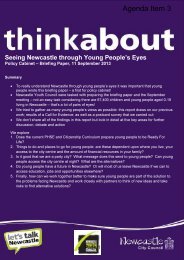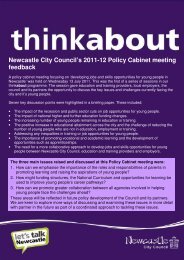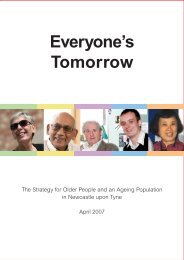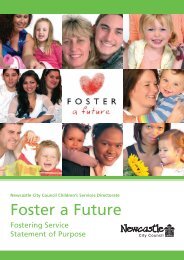NEWCASTLE'S MUSICAL HERITAGE AN INTRODUCTION By ...
NEWCASTLE'S MUSICAL HERITAGE AN INTRODUCTION By ...
NEWCASTLE'S MUSICAL HERITAGE AN INTRODUCTION By ...
You also want an ePaper? Increase the reach of your titles
YUMPU automatically turns print PDFs into web optimized ePapers that Google loves.
direction. That is until 1888 when he was told in so many words by the committee<br />
not to anticipate their approval but to curtail his enthusiasm and await the<br />
committee’s instructions. That same month Mr Rea tendered his resignation from<br />
the Council’ employment, which was accepted by the Council. The committee<br />
concluded that in the circumstances he ‘could not be had’ for the Peoples<br />
Concerts and they appointed Mr Hirschmann, who ran a piano shop in town.<br />
Up to 1890 the concerts were still in credit, but by 1892 it was noticed that<br />
artists fees were exceeding expenses and one Council member complained that<br />
exorbitant prices were being paid for professional artists. (More than one<br />
Amateur Society had bankrupted itself over professional artists fees) and the<br />
committee became divided as to the continuance of the concert series. One<br />
source of contention was that the Music in the Park’s Committee had creamed off<br />
the profits made at the People’s Concerts to pay for Sunday band concerts in<br />
public parks. <strong>By</strong> 1896 full blown committee rows were taking place with the anticoncert<br />
lobby pointing out that several large rate payers made their living out of<br />
giving concerts and the Corporation had no right to take away their source of<br />
livelihood by giving cheap concerts subsidised from local taxes. The pro-concert<br />
lobby pointed out that the Council had a duty to make brighter and better lives for<br />
the people they represented and that there were hundreds of causes in<br />
Newcastle where they were spending money for which in one sense they got no<br />
return. It was further pointed out that private enterprise in Newcastle had so far<br />
done nothing for the musical education of the Newcastle people (resounding<br />
Hear! Hear!) and it was the People’s Concerts that had stirred public enterprise<br />
to do its duty. Parallels were drawn with Leeds and Birmingham and it was<br />
pointed out that prior to the introduction of the People’s Concerts in Newcastle<br />
there had been the same second-rate class of concert from year’s end to year’s<br />
end. This was not entirely true but it was make or break time. Fortunately the<br />
decision was in favour of the concerts continuing for another season at least.<br />
The debt continued to rise, however, and in 1903 an unnamed public<br />
benefactor sent a cheque for a substantial sum to help reduce the deficit but it<br />
only made matters worse. The committee chairman accepted it but the Mayor<br />
was livid and considered it humiliating. He said the Council could not possibly<br />
accept and instructed the City Treasurer to give it back .to the Gentleman<br />
concerned. Further heated discussions over finance ensued but in the end<br />
reason prevailed with one member pointing out that the Council should provide<br />
‘good’ music for the public to elevate and educate the people and if they didn’t<br />
they would simply find themselves in competition with the music halls, A<br />
dissenting voice countered with, ‘the poorer people for whom these concerts<br />
were originally intended are no longer attending and those that are, are better off<br />
and could afford to pay more’ And so the arguments went on and the concert<br />
seasons continued but there was that feeling in the air that perhaps they had<br />
outlived their purpose. However, like all public institutions once established it<br />
proves more difficult to do away with them. Committee meetings became ever<br />
stormier with one councillor even invoking the British Empire in his oration when<br />
49

















